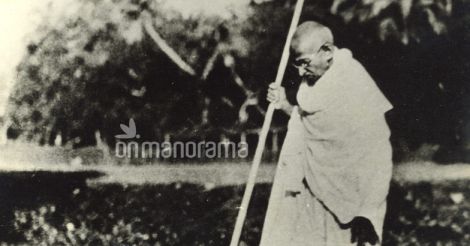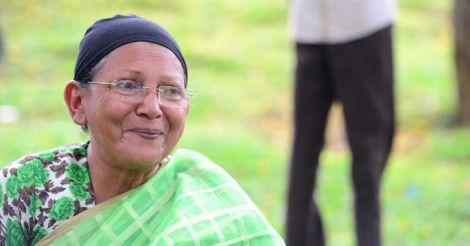Jameela Malik, a trailblazer, was the first woman from Kerala to enter the famous Pune’s Film and Television Institute as an acting student. She later worked with film maestros and matinee idols yet settled for the low-profile life of a hostel matron. The veteran traces her unbroken spirit to her strong-willed parents and the national movement that united them. She recalls her career:
Our house at Jonakappuram in Kollam was almost like a movie set. It was always crowded. My father, Malik Muhammed, was a Congress leader and municipal councillor. The friends who came to meet him and the relatives who visited the family made sure that our house was always awake.
My paternal grandfather traces his roots to Arabia. His ancestors are said to have sailed to Kozhikode to trade. He made it big in business.
He resembled a movie hero with his height, dark complexion and shining eyes. He went to Kollam and settled there after marriage. The locals called him “Karutha Labba” (The Black Labba). He did something unheard of in those times. He started a school - The Muhammed Memorial School. Me and my three siblings went to that school.
My grandmother was not like him. She was fair and pretty. It was her second marriage. Her son from the earlier marriage grew up with the same privileges of the younger children.
I remember living with my grandmother, an aunt named Asiya Ummal and the rest of the family. Still the pillar of strength in the family was my mother Thankamma Malik. She could withstand any storm and faced any crisis without flinching. I wish I had inherited some of her courage.
Mother - The woman who followed Gandhi
My mother was from a Christian family in Konni. She was the fifth of the 10 children of Eliyamma and A T Varghese of the Mekkattathu family. They were broadminded. They made sure that their children grew up with a sense of freedom. My grandfather was just 12 years old when he married his six-year-old bride. She became a mother at 16.
My grandfather was a contractor in the Konni estate. He was very rich. And he was very loving. He was friends with almost all leaders of the Travancore State Congress.
When the authorities denied permission for a Congress meeting at the Konni market square, he challenged them by holding the meeting in the coconut farm in front of his house. Top leaders including G Ramachandran, T M Varghese and C Keshavan attended that meeting.
My grandfather spent a lot on disputes and court cases, my mother used to say. Yet he never compromised on the education of his children. He enrolled his oldest daughter to a medical course. She died of an illness even before she completed the course. The second son became a homoeo practitioner.
Another uncle left his home early in pursuit of his interests in music and literature. My mother’s younger sister found a job as a nursing superintendent in Karachi. She married a major general there. Her sister Omana followed her and found a calling there. She married a senior officer in the embassy. Both my aunts accepted Islam. I remember them visiting us with families a couple of times. Those were festive times. They named my younger brothers Malhural Haque and Fazalul Haque.
My mother had little in common with them. It was the days of the freedom struggle and even people in the villages wanted to learn Hindi. My mother’s first teacher was Mavelikkara Sreedhara Kurup. She passed the Hindi Praveshika exam and joined the Shradhananda Hindi College in Kottayam for the Rashtrabhasha Visharad studies. The college was run by Pandit Narayana Dev. Freedom struggle and Hindi studies were almost identical then. The college was a meeting place for Congress leaders.
My mother was deeply influenced by Mahatma Gandhi’s speech at a Congress convention at Thirunakkara in Kottayam. She had worn nothing but khadi from that day. She was so energised by the speech that she wrote to Gandhi expressing her wish to live by him and learn Hindi.
She was delighted to receive a reply from Gandhi, who congratulated her passion and told her that all arrangements had been done for her to live at the Mahila Ashram at Wardha.

My grandfather felt that the letter was an honour. He took my mother to Wardha. She met Jawaharlal Nehru, Jamnalal Bajaj, Kamala ji, Rajaji and Indira during her stay in the ashram. Indira and my mother were almost the same age. Mother had even translated Indira’s speeches in election meetings in Kerala.
She has told us how she attended the Congress convention in Tripura as a volunteer, how she heard Sarojini Naidu speak at the meeting and how she heard Subhadra Kumari Chauhan recite her poems. Bengalis took out a procession when Subhash Chandra Bose defeated Gandhi’s nominee to become the Congress president and Bose himself had to be carried on a chair for the swearing-in because he was down with fever.
Mother returned after a year. She started teaching Hindi in the Maharaja’s Girls High School in Thiruvananthapuram. Her students included N Gopala Pillai, Annie Mascarene and Kerala Varma.
She acted in the title role in a Hind play named ‘Noor Jahan’. T N Gopinathan Nair acted as Jahangeer.
She received a Dalmia scholarship in 1942. She did her higher studies in the Prayag Mahila Vidya Peetham in Allahabad. The college was run by poet Mahadevi Varma. Mother would soon become a favourite student of Varma. She funded her travel with the money she earned as a writer. She sold the rights to her books to the Chandra Press in Thiruvananthapuram. They were ‘Kanakalatha’ and ‘Cherukatha Manjari’.
She later translated Mahadevi Varma’s poems to Malayalam. She was in the company of famous persons including Premchand’s wife Shivarani Devi and Subhadra Kumari Chauhan.
Father - The man who swayed the crowds
My father was speaking to a crowd, wearing a garland. That is my grandest memory of him. He was always surrounded by an army of Congress workers. He used to publish a weekly named ‘Mithram’. He was helped by his nephew in composing the types, printing the weekly and circulating it. I spent most of my childhood in that office, which survived at Kottamukku in Kollam until recently. We had regular visitors in Kambisseri Karunakaran and A A Rahim, who would later become the governor of Meghalaya. They debated political affairs. I was too young to understand any of those but I remember my father getting elected as a councillor and the people celebrating his victory.
Mother used to write stories for ‘Mithram’. Eventually she became close to my father. The affair was scandalous in those days, they had told me later.
They got married in Kollam in 1945. Both the families opposed the alliance yet they stood firm in their determination. Eventually they won over everyone. Mother never confined herself to the household chores. She was with my father in his social activities and publishing business.
Then the tragedy struck.
(To be continued...)

























 Jameela Malik traces her unbroken spirit to her strong-willed parents and the national movement that united them.
Jameela Malik traces her unbroken spirit to her strong-willed parents and the national movement that united them.